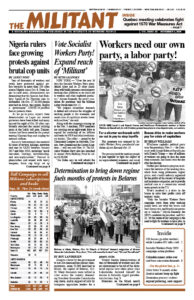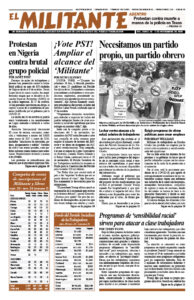November 6, 1995
NEW YORK — The five-day whirlwind visit by Cuban president Fidel Castro here dominated the news in this city and across the country for nearly a week. It shows vividly the weight of revolutionary Cuba in world politics today — the only country where the working class holds state power with a communist leadership at the helm.
Castro was at the center of attention as he explained that the Cuban people have steadfastly stood “in solidarity with the poor of this earth.”
Above all, the event that captured the appeal of the Cuban revolution to many working people — especially Blacks, Puerto Ricans and other Latinos — was the meeting at the Abyssinian Baptist Church in Harlem. It was Castro’s second appearance in Harlem, which he first visited in 1960, shortly after the triumph of the Cuban revolution.
November 6, 1970
CARBONDALE, Ill. — The United Front for Survival Conference held here Oct. 24- 25 and attended by more than 500 Blacks has established the beginnings of a National Black United Front. It was organized by the Black United Front from Cairo, over 50 miles away.
Cairo is a town of 7,000, half of whom are Black. Over 150 armed attacks have been carried out against its Black community since April 1969 when, in response to previous assaults, Blacks organized the United Front.
The attacks have been the work of police, Illinois state troopers, and a white vigilante group known as “The White Hats,” organized by the local state’s attorney. The attacks have escalated during the past month.
Conference goers got on buses and joined one of the regular Saturday mass rallies in Cairo to show their solidarity.
November 3, 1945
The great majority of the working people of France registered in the general election October 21 that they want to finish with the capitalist system and organize a socialist society. This is the meaning of the landslide for the Socialist and Communist Parties.
The Radical Socialists, who long dominated French politics, have been shattered. This party was neither radical nor socialist. It represented the capitalist class which plunged France into the Second World War. Along with the Radical Socialists the old rightist parties were obliterated as a political force.
None of the parties gained a clear majority. This may open the road for a politician like [Gen. Charles] de Gaulle to become “supreme arbiter,” as the N.Y. Post puts it. Sharp struggle and profound political crises are indicated in the coming period in France.

